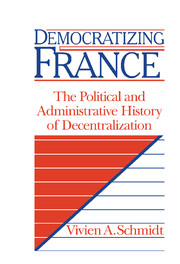Book contents
- Frontmatter
- Contents
- Preface
- PART I THE POLITICAL HISTORY OF DECENTRALIZATION FROM THE FRENCH REVOLUTION TO THE PRESENT
- PART II THE IMPACT OF DECENTRALIZATION ON LOCAL POLITICS AND ADMINISTRATION
- Introduction: When informal rules become formal roles
- 6 When informal rules counter formal roles: Local government before the Socialist reforms of the Fifth Republic
- 7 Rhetoric versus reality in local government: Local politics and administration before the Socialist Fifth Republic
- 8 When informal rules become formal roles: The new pluralism in the institutions and processes of local government
- 9 Unblocking society by decree: The transformation of the politico-administrative system
- 10 A new rhetoric and a new reality in local government: Local politics and administration in the Socialist Fifth Republic and beyond
- Conclusion
- Bibliography
- Index
10 - A new rhetoric and a new reality in local government: Local politics and administration in the Socialist Fifth Republic and beyond
Published online by Cambridge University Press: 03 May 2010
- Frontmatter
- Contents
- Preface
- PART I THE POLITICAL HISTORY OF DECENTRALIZATION FROM THE FRENCH REVOLUTION TO THE PRESENT
- PART II THE IMPACT OF DECENTRALIZATION ON LOCAL POLITICS AND ADMINISTRATION
- Introduction: When informal rules become formal roles
- 6 When informal rules counter formal roles: Local government before the Socialist reforms of the Fifth Republic
- 7 Rhetoric versus reality in local government: Local politics and administration before the Socialist Fifth Republic
- 8 When informal rules become formal roles: The new pluralism in the institutions and processes of local government
- 9 Unblocking society by decree: The transformation of the politico-administrative system
- 10 A new rhetoric and a new reality in local government: Local politics and administration in the Socialist Fifth Republic and beyond
- Conclusion
- Bibliography
- Index
Summary
Despite its limitations, Socialist decentralization has had an important impact on local politics and administration. By altering the executive powers and administrative responsibilities of all major actors in the periphery, it has changed the roles, rules, and interrelationships of all local elected officials and administrators. By turning the heads of every level of local government into powerful, popularly elected officials while limiting the number of offices they can accumulate, it has introduced a new pluralism into local administrative arrangements and a new kind of politics into the periphery, increasing the size of the political class, strengthening party politics, and introducing national cleavages and concerns at every level of local government. The new administrative interdependence and the new politics, in brief, have greatly complicated the lives of the newly powerful local elected officials. They no longer have an easy way out of this situation, given the new transparency of local government that denies them the use of the old rhetorics.
With their new powers and formal responsibility for local government, local elected officials can no longer resort as readily to the rhetoric of centralization that hid their complicity with local administrators from public view and enabled them to avoid taking responsibility for their actions. With the greater politicization of all levels of local government, they can no longer use as convincingly the rhetoric of apolitisme, or nonpartisanship, to allay the local population's fears of political patronage, to reconcile their political allegiances with their administrative functions, or to avoid central political interference.
- Type
- Chapter
- Information
- Democratizing FranceThe Political and Administrative History of Decentralization, pp. 342 - 388Publisher: Cambridge University PressPrint publication year: 1991



